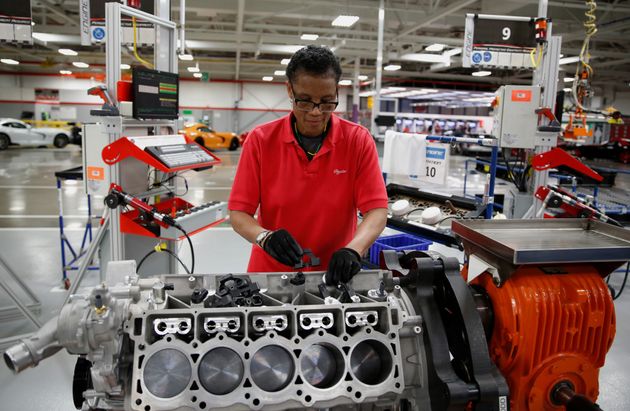
Where unions are strong, they raise standards across an industry, according to a new study.
The dramatic nationwide drop in private-sector union membership has lowered pay for non-union workers over the past four decades, a study released Tuesday argues.
The paper, published by the Economic Policy Institute, a liberal think tank that receives some of its funding from unions, provides new evidence for a longstanding truism among organized labor’s proponents: that in industries where union density is high, even non-union firms pay their workers more to meet the standards set by unions.
In the year of a presidential election characterized by populist discontent, the report’s findings are fresh ammunition for progressives who maintain that strengthening unions, rather than, say, closing our borders to immigrants, is the key to restoring broad wage growth and stemming income inequality.
“Many American workers can see those unions as either minor bit players in today’s economy or good for union members alone to the detriment of society at large,” said Jake Rosenfeld, a sociologist at Washington University in St. Louis who co-authored the study. “This is a study that says that’s wrong: unions are good for members and non-members alike.”
Non-union men have been hit harder than non-union women by the decline in unions, since they were more likely to belong to unions prior to the 1980s, according to the report. (The percentage of male private-sector workers in a union went from 34 percent in 1979 to 10 percent in 2013.)
If the private sector still had union membership rates at the 1979 level, American men in that sector without union representation would have earned $2,704 more in 2013, or a 5 percent increase.
For less educated men in the private sector, among whom union membership was more common in 1979 than men overall, the effect of the decline is even starker.
Non-union men without four-year college degrees would have made $3,016 more in 2013 ― an 8 percent increase ― under 1979 levels of union membership. And non-union men with a high school degree or less would have made $3,172 more in 2013 ― a 9 percent increase ― under this scenario.
By contrast, expanded trade with low-wage nations in recent decades is responsible for a 5 percent drop in the wages of non-college-educated workers, according to a figure cited in the paper.
The non-union women workers hit hardest by the decline of unions are also those with a high school degree or less. Non-union women with that education level would be earning $676 more in 2013 if the women’s private-sector union rate remained what it was in 1979.
There are several reasons the paper offers for why higher union membership rates would benefit workers not covered by those unions’ collective bargaining contracts. Chief among them is the fear non-union firms have that their workforce will be vulnerable to a union organizing drive if they’re paid significantly less than their unionized competitors. The non-union firms in heavily unionized industries and regions may also need to pay more to attract the workers with the best skills.
Currently, just 6.7 percent of all private-sector workers belong to unions, according to the Bureau of Labor Statistics ― down from roughly one-third in the 1950s.
It is no wonder, the paper maintains, that pay has barely risen for workers across the economy since the 1970s, and actually gone down for workers with a high-school degree or less.
Rosenfeld, whose book What Unions No Longer Do documents the effects of organized labor’s falling fortunes, said the paper is intended as an indictment of the specific policies that have contributed to the decline of unions.
He blames the dwindling of union ranks in the private sector on the rise of intense employer opposition to unions and an outdated set of labor laws that leaves workers with too little leverage to counter these tactics.
It is a myth, Rosenfeld argues, that the decades-long wave of private-sector de-unionization is merely the result of a technology- and trade-induced drop in American manufacturing jobs.
“Union decline is not simply a story of outsourcing and automation,” Rosenfeld said. “If you look at industries like trucking and construction, you see unions getting killed in those industries and wages for non-union workers going down as well.”
Charts & More: Why The Decline Of Unions Has Lowered Pay For All Workers
As someone who has worked on both sides - I strongly believe in a reasonable balance between management and labor - and unions help provide that reasonable balance. A rising tide lifts all boats.
Last edited:
